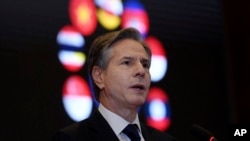The Biden administration is expected in the next several weeks to announce plans for an "Indo-Pacific economic framework," marking the culmination of months of work to reinstate the United States as a counterweight to China and as a major player in developing the trade rules that govern the region.
U.S. business and trade groups have been anxious for the administration to establish itself as a presence in Indo-Pacific trade discussions, five years after the Trump administration formally removed the United States from the Trans-Pacific Partnership, a comprehensive trade agreement that the Obama administration had worked for years to complete.
In October, the White House released a statement from President Joe Biden that said the objective of the framework would be to "define our shared objectives around trade facilitation, standards for the digital economy and technology, supply chain resiliency, decarbonization and clean energy, infrastructure, worker standards, and other areas of shared interest."
Over the past few weeks, different administration officials have dropped hints that the effort, led by the Office of the U.S. Trade Representative and the Commerce Department, was beginning to bear fruit.
During an event hosted by the Washington International Trade Association last week, Sarah Bianchi, deputy U.S. Trade representative for the Asia-Pacific region, said that there is still some way to go toward completing a formal plan but that "there's a fair amount of meat to the approach that we're thinking about."
An opportunity to write the rules
"It's important that the administration has started to telegraph some of their engagements in the Indo-Pacific," Jake Colvin, president of the National Foreign Trade Council, told VOA. "We're encouraged by a focus on engaging with economic allies in the region on a whole suite of issues."
He added: "We've said for a long time that the Biden administration has an opportunity to write the rules on digital and e-commerce in the Indo-Pacific (region), and we're excited that they appear to be starting to think through how to seize that opportunity."
The administration's aim does not appear to be the construction of an overarching agreement that touches on all the issues mentioned by the president. Instead, experts such as William Reinsch, the Scholl Chair in International Business at the Center for Strategic and International Studies, expect the negotiations will be siloed. For example, countries could decide to negotiate on standards for the digital economy and supply chain resiliency while not engaging on workers' standards and decarbonization.
Other experts such as Gary Hufbauer, a senior fellow with the Peterson Institute for International Economics, question whether the administration can achieve many of its goals given that it has signaled it will not be able to offer expanded access to U.S. markets to the countries most in need of it. Doing so would require dismantling tariff regimes that are popular with much of the president's Democratic base as well as with many Republican lawmakers.
Not much to offer
The fact that no substantial changes will be made to market access rules will be a significant deterrent for other countries, Reinsch, of CSIS, told VOA.
"For the small Asian countries joining something like this, which is probably going to be opposed by China, they're not going to do it unless they see significant enough advantages to overcome the Chinese reaction," Reinsch told VOA. "We've taken market access off the table, so the question for the administration is, 'So what's on the table?'"
Reinsch said that by signaling upfront that it doesn't plan to go to Congress to seek changes to existing trade agreements, the administration is putting clear limits on expectations.
"What we're saying is, 'We're expecting you guys to make all the concessions, and we're going to keep on doing what we're doing,'" he said.
'Best efforts' may be best-case scenario
Hufbauer, of the Peterson Institute, told VOA that he agreed it was unlikely that the administration could extract many binding commitments from its partners, because the kind of benefits that would make substantial changes worth the cost aren't going to be on the table.
"What the U.S. wants to get other countries to do is commit to better labor standards. That would be, obviously, Vietnam and maybe Malaysia, which discriminates against its Chinese citizens. And to pony up on their environmental commitments," Hufbauer said.
However, he said, he thinks it is unlikely that the administration could persuade developing countries to commit to anything other than vague language promising to make their "best efforts" at meeting U.S. requests.
"They're not about to agree to anything binding in those areas unless there's some U.S. concessions on the other side on market access, which the U.S. is not about to do," Hufbauer said.




